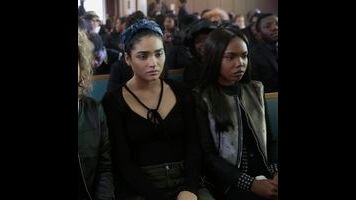Star’s Black Lives Matter episode isn’t as cringeworthy as it could’ve been

Perhaps the best thing I can say about “Black Wherever I Go”—and this will sound so much more damning than I mean it to be—is that it’s not nearly as cringeworthy as I thought it would be. I was worried that Star would handle the Black Lives Matter movement, and the justifiable outrage of the African American community, with the same inelegance that it has handled other plot points, bringing up serious issues simply so they can be used for some sort of shock value. But I thought “Black Wherever I Go” worked at points, putting protests with meaning in primetime, and didn’t work in other ways.
One of the reasons that this episode didn’t feel slimey was because it didn’t use the protest as a launching pad for soap operatics. Everything that happened around or because of the protest seemed like it was trying to portray the movement in positive light without exploiting it for other means. There’s no way that the creators of the show could have known that they would be airing this episode during the current political climate, where major protests are a weekly occurrence and the Senate just confirmed a noted racist as our Attorney General. So I can’t help but feeling that by simply putting this type of protest on television in this way outweighs some of the episode’s lesser qualities.
What didn’t work was making Star the victim of this episode. Ryan Destiny plays Alexandra in this constant state of annoyance. Her complaints about Star are actually valid. Star is a famewhore who is more interested in her own notoriety than that of the group’s, which is even more problematic considering that Alex is the brains behind Big Trouble in various capacities. But instead of seeming like the sympathetic, under appreciated genius, Alex instead makes herself a villain. There’s nothing about her that’s likable or makes me want to root for her over Star, and that’s saying something because there’s not a lot of reasons to root for Star either. But because of that, Alex’s objections to Star not singing at the protest, not just because of the color of her skin, but also because of her basic narcissism, made Star seem like a victim. And there’s no way that the white girl should ever be the victim in an episode about the Black Lives Matter movement, especially considering the racial controversies of a white woman leading a group between two women of color that already weigh Star down. That’s only compounded by Eva’s actions, where Star becomes the victim twice over, when she’s pushed out of the group for the protest performance in some sort of All About Eve situation.
There is an interesting point made in the middle of Star’s victimhood though. As Star argues about why she should help represent the group at the protest, she expresses how she wants to be an ally. Yet, she plays the victim once again when rebuffed, which pretty much goes against being an effective ally. Star argues that her experience mirrors that of the protesters more than Alexandra’s silver-spoon-up-the-butt because of their shared class. She is everyday people, she tells Alex. Alex counters with the line that gives the episode its title: “College Park or Park Avenue, I’m black wherever I go.” Simone agrees. They share an experience that Star can never have despite her class experience. It’s a surprisingly complex point even if it was the basis of a scene, rather than an episode, and allowed Star’s victimhood to dissipate just a bit.
The rest of the episode? Doesn’t fare as well because I still don’t care about anything that has to do with Hunter and Arlene, and now Hunter’s apparently psycho dad. I’m not sure why these characters are people I should be paying attention to, even though they are becoming more entangled in the plot. Eva seems like more a distraction who will eventually be put out to pasture as soon as her usefulness as a character is over, and that makes it hard for me to be invested in her potentially evil machinations, especially considering they way she entered into the show was so twisty and confusing that her mystery doesn’t have a clear thread to follow and, therefore, invest in. Not to mention that the girl reveals she can speak more English than she let on, and everyone seems to just accept that. When Star succeeds, it succeeds in its central plotting, but it’s those satellite plots that I still can’t get interested in.